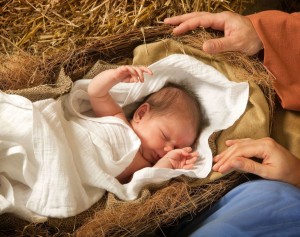
We’ve all read the articles, seen the documentaries and heard the scholarly opinions on a litany of controversial Christmas subjects: Jesus wasn’t born on December 25th; the shepherds weren’t tending their flocks in the winter; the Wise Men didn’t visit the manger; Christmas is a pagan holiday… the list goes on and on. While each subject holds its own intrigue, their debate should not hold the Christmas celebration hostage.
Among these subjects are the naysayers who say that a cultural tradition like Santa Claus detracts from Christ’s birth and disillusions our children. Certainly for poorer children, Santa may have represented nothing more than unfulfilled dreams. Growing up in a middle class family however, Santa Claus was a wonderful mystery to me: A great benevolent figure that could not be seen, but would sneak into our house with wonderful gifts. In one night, he could travel the world. The concept was thrilling and magical.
The “magic” of Santa Claus didn’t detract from Christ’s birth for me. Though excited about Santa’s imminent visit, I would sneak out at night to quietly stare at the baby Jesus in the faint blue light of our manger scene. “All for this one little baby,” I would say to myself. “How special you must be.”
When I learned that Santa Claus did not exist (which only happened last year), I was not traumatized. I was admittedly a bit perplexed, but later realized that my childhood Christmases had been my own “road to Emmaus.” Like the disciples in the book of Luke, I had been walking and talking with the Lord until the time came when I could truly see him for who he was. Through my parents love — their covert Christmas gifts (from Santa), their sacrifice, their incremental teaching — I had learned lessons about my heavenly father as well. And when the time came and the truth was revealed, (like it was to those two disciples who’d walked that dusty road), I said excitedly:
“Did not (my) heart burn within (me) while He talked with (me) on the road, and while He opened the Scriptures to (me)?” (Luke 24:32)
My understanding of Jesus was enhanced by other Christmas traditions as well. The star on the top of our tree reminded me of that glorious guiding light that led the wise men; and the angel reminded me of the heavenly birth announcement. Fromthe Christmas tree I got my first inkling of eternal life — God made a tree that remained ever green through the darkest winter.
The manger scene was my first reality show. I contemplated each figure and why they were there. I watched them every night — frozen in time like the figures on Keats’ Grecian urn. How could a king be born in the hay among animals?I had been born in much better circumstances — a sterile hospital and tended by nurses, but I had no royal blood.
As my comprehension and spiritual awareness grew, I learned that the rulers of that time wanted this baby dead. They knew he would grow in authority and power to challenge the greatest rulers of the time. (Little did they know he would still be challenging them over 2000 years later.) His parents took him into hiding. He went on to grow up in a small town most viewed as “the wrong side of the tracks.” He didn’t graduate from Yale or Harvard, nor spend his post graduate years preparing to climb the corporate ladder. Instead, he learned the simple trade of his father and became a carpenter.
And while the famous Christmas classic, It’s a Wonderful Life teaches us that, “No man is a failure who has friends,” — this JesusI learned of was betrayed by every friend he had.
As we mature, we gain a greater appreciation of the impact of that babe on ourselves and the world. He would endure much pain and suffering as an adult, but he would overcome the world:
These things I have spoken unto you, that in me ye might have peace. In the world ye shall have tribulation: but be of good cheer; I have overcome the world. (John 16:33)
If He could suffer great tribulations and still overcome the world; we are strengthened in our faith that we can too. So many “feel good” churches and televangelists try to convince us that poverty and unhappiness are the result of a spiritually misspent life. They seem to forget it was the man who owned nothing but the clothes on his back; the “man of sorrows… acquainted with grief,” who brought the greatest hope mankind has ever known.
So we celebrate his birth, though there are no directives in the Bible to do so. We celebrate because through the innocent babe born that night, we are reminded that the lowest of the low, the outcast, the poor wanderer who has no place to lay his head, the man who is spat upon and falsely accused — are all as worthy of our love as the man society holds in high esteem.
So let’s not get bogged down in debating dates, or pondering the merits of our established traditions. Let the celebrations begin. Let us be thankful that a world being sucked into an accelerating vortex of evil still sets aside at least one day a year to fall to its knees beside a dirty manger and say, “Thank you God, for this little baby… that we should not perish, but have everlasting life.”
Originally published in American Thinker:
http://www.americanthinker.com/2013/12/an_evil_world_falls_to_its_knees_once_again.html








